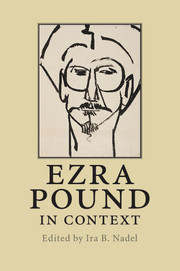Book contents
- Frontmatter
- Contents
- Notes on contributors
- Acknowledgements
- Chronology
- List of abbreviations and note on references to The Cantos
- Introduction
- Part I Biography and works
- 1 Prose criticism
- 2 Poetics
- 3 Translation
- 4 Romance languages
- 5 Letters
- 6 Editor, anthologist
- 7 Education
- 8 Journalism
- 9 Politics
- 10 Economics
- 11 Radio broadcasts
- 12 Law
- 13 Textual criticism
- 14 Archives
- 15 The Lives of Pound
- Part II Historical and cultural context
- Part III Critical reception
- Further reading
- Index
6 - Editor, anthologist
Published online by Cambridge University Press: 05 July 2014
- Frontmatter
- Contents
- Notes on contributors
- Acknowledgements
- Chronology
- List of abbreviations and note on references to The Cantos
- Introduction
- Part I Biography and works
- 1 Prose criticism
- 2 Poetics
- 3 Translation
- 4 Romance languages
- 5 Letters
- 6 Editor, anthologist
- 7 Education
- 8 Journalism
- 9 Politics
- 10 Economics
- 11 Radio broadcasts
- 12 Law
- 13 Textual criticism
- 14 Archives
- 15 The Lives of Pound
- Part II Historical and cultural context
- Part III Critical reception
- Further reading
- Index
Summary
Ezra Pound's contributions to the formation of modernism are often recognized with regard to his constant experiments in poetic form, his literary criticism, and his mentoring (and occasional editing) of fellow modernists. His editorship of several poetry anthologies also point to his significance in the inception and coalescence of modernism as an aesthetic movement and academic field. Pound's four anthologies – Des Imagistes (1914), Catholic Anthology (1915), Profile (1932), Active Anthology (1933) – reveal his critical revision of the dominant forms of the anthology in order to produce readers as stewards of literary innovation.
Pound's anthologies bookend what Chris Baldick has termed a “great age of anthologies,” when such literary compilations became a primary vehicle for circulating – and in the process defining – contemporary, modernist verse. From the mid-teens through the early 1930s, an array of editors endeavored to fashion anthologies for a wider readership after World War I, when a general audience swelled to include student populations, largely made up of middle-class adolescents who enrolled in high school and university literature courses. Such editors included little magazine editors such as Harriet Monroe, literary reviewers such as Louis Untermeyer and Marguerite Wilkinson, and poets such as Conrad Aiken, Alfred Kreymborg, Amy Lowell, Edith Sitwell, and Ezra Pound.
Anthology editors’ methods of selecting, and more significantly, introducing readers to the new poetry depended upon whether their anthologies targeted a “mainstream,” general audience (which prior to 1930 included academic audiences) or select or “coterie” readerships. Louis Untermeyer and Harriet Monroe, editors of the era’s more popular literary anthologies, provided editorial guidance for their general and academic readers by including ample prefaces and authorial biographies. For example, Untermeyer’s Modern American Poetry (published in six editions from 1919 to 1950) and Monroe’s The New Poetry (published in 1917 with revised editions in 1923 and 1932) focused primarily on literature from 1890 to the present and went through several editions that were marketed to both general and academic audiences.
- Type
- Chapter
- Information
- Ezra Pound in Context , pp. 65 - 74Publisher: Cambridge University PressPrint publication year: 2010

